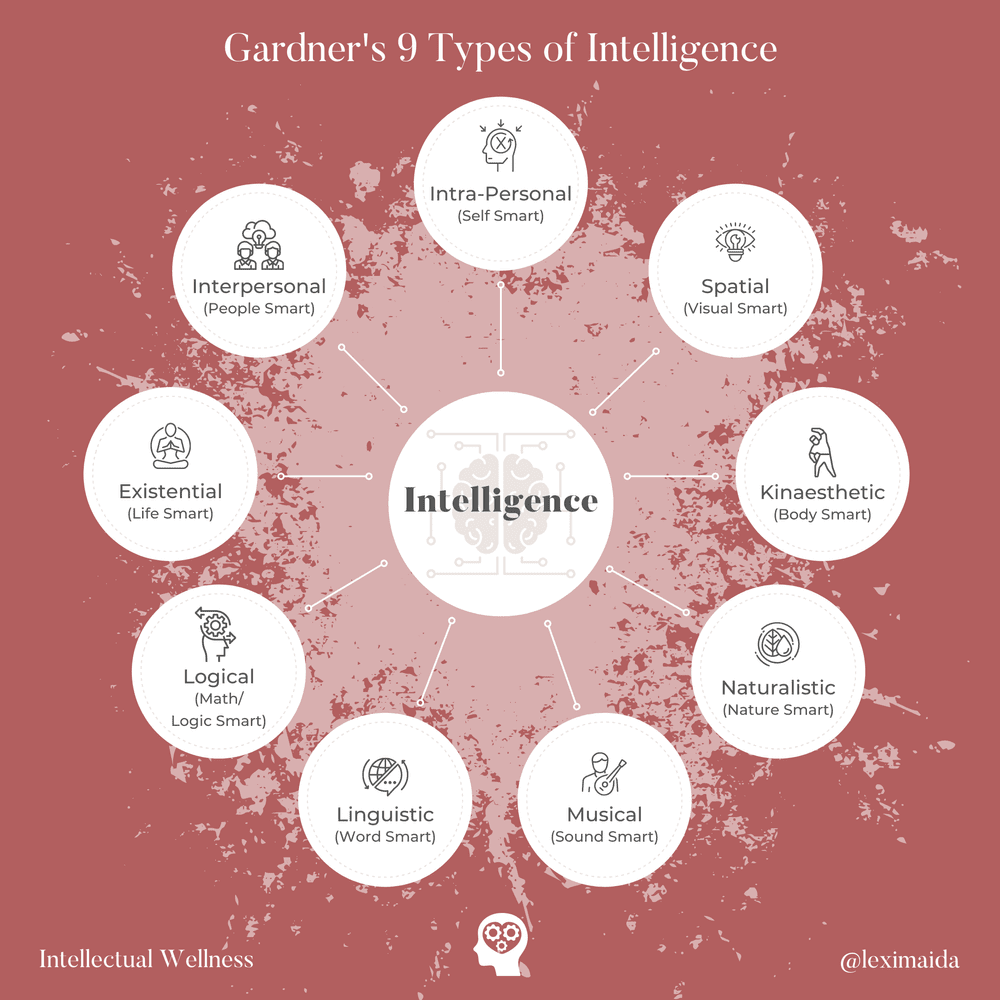Intellectual Wellness: 9 Types of Intelligence
Meet me as a first grader. I was a bright blonde burst of sunshine, and, as the sixth of seven children and youngest daughter, it was my birth-order position to entertain. Needless to say, these characteristics unknowingly branded me as the “blonde” stereotype and diminished my traditional intellectual currency within my family and preschool social life. I was just "little Lexi" and the expectation was to be sweet and entertaining. It took my first grade teacher requesting that I have an IQ test for my mom to realize I had something more involved going on in that little noggin of mine. I was put into a "gifted" program with accelerated education and monitoring, which allowed me to ultimately skip tenth grade when I desired to exit my high school years early.
Intelligence actually comes in many forms, and we've branded it all wrong as a society. Even if I hadn't been tested for the traditionally measured Logical-Mathematical Intelligence, I was actually exhibiting different forms of intelligence in my social behavior, namely Interpersonal Intelligence. Perhaps it was nurture over nature that formed a social strength to my personality, and perhaps it was nature over nurture that gave me the ability to work with patterns, math, and logic. Once I was tested for logical intelligence, that became my intellectual identity. Interestingly, I never knew I had other forms of intelligence to embrace and exercise. At 38 years old, I can reflect and see ways it would have been extremely advantageous to know these were like intellectual muscles I should have been exercising.
BUT, I can now see that is why I have this awareness at this point in my life, and it is my mission to share with you.
Gardner’s Types of Intelligence
Harvard Psychologist, Howard Gardner, developed the theory of multiple intelligence in his 1983 book, "Frames of the Mind: The Theory of Multiple Intelligences”. He argues that traditional psychometric views of measuring intelligence are too narrow, and it would be incomplete to judge someone’s intelligence by one or two factors alone. He outlined nine forms of intelligence: Naturalistic, Musical, Logical-Mathematical, Existential, Interpersonal, Linguistic, Bodily-Kinaesthetic, Intra-personal, and Spatial.
There is a large spectrum of potential and capacity for growth that we as a society have not fully explored. Most of us are all too familiar with our culture's focus on Logical Intelligence. Einstein could be the poster boy for this intelligence with his E = MC2! His messy-haired mug is cemented in my mind as the visual for an intelligent person. Interestingly, Einstein actually was extremely bright in multiple forms of intelligence. I read that he would step away when he was stuck on a tough mathematical problem, play his violin, and he would often come to the solution. He was actually tapping into other areas of his brain and exercising his Musical Intelligence.
“Music helps him when he is thinking about his theories,” said Elsa, who became his second wife in 1919. “He goes to his study, comes back, strikes a few chords on the piano, jots something down, returns to his study.” (source)
None Better Than The Others
The truth is no type of intelligence is better or more valuable than any other. We all have different measures of each of them, but we likely would excel in specific forms given the opportunity and support in understanding the potential value. If you know what you're working with, you can maximize your inherent advantages and highlight the areas where you may want to exercise in order to succeed.
Here is a test to find out what forms of intelligence you have. I hope you will ponder your forms of intelligence and see yourself in a new SMART light!
Analyze your forms of intelligence and be well!




